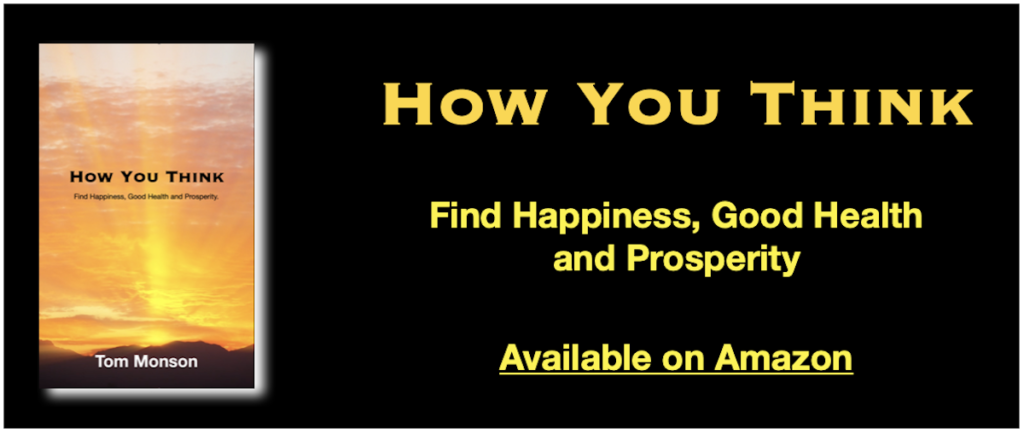How To Find Happiness, Good Health, and Prosperity.
This is the first in a series of articles designed to help you realize the life you want.
“Each one of us could live a charmed life of happiness, good health, and prosperity. All we have to do is control our thinking.” That’s why how you think will set the course of your life.
The Human Condition – How You Think
Having followed many motivational speakers (now called thought leaders) for more than half a century, I learned everything I needed to know about the human condition.
I grew up in a home where dysfunctional would have been a big improvement. This upbringing gave me a strong desire to always want to be better. With a constant need to gain feelings of worthiness and to overcome past difficulties and trauma.
To better myself by overcoming my deficits, I continually sought help through study, mentorship, and any other means that offered the potential of help.
Associating with these thought leaders, meeting and getting to know many other people like me who were also trying to make themselves better, I realized that the vast majority of us human beings, other people like me, need help.
In my effort to make myself better, I read, studied, and tried any number of other ways to find out why I couldn’t shake the feeling that I was not enough, I was not worthy, I must do better, and any number of other shortcomings I felt.
As I studied all these thought leaders, I could never get over the feelings of not being enough. I can’t tell you how many hours, months, and years I devoted to working on myself.
I finally resigned myself to the idea that I am always going to have these feelings of inadequacy. I decided that I would just have to learn to live with my own human condition.
But one day, I was doing my research and came across the book As A Man Thinketh, by James Allen. I noticed that it was originally published in 1903. But more importantly, I recalled that it had been referenced by many of the thought leaders I have read, listened to, and met.
Origins
I can’t discount these thought leaders because the ones I met, I really believe they work tirelessly to help me improve my life. I’m talking about thought leaders who dedicated their lives to helping people like me and you. People like Tony Robbins, Zig Zigler, Earl Nightingale, Jim Rohn, Bob Proctor, Jack Canfield, Eric Thomas, Les Brown, Brendon Burchard, and so many others.
Common elements of these folks are most of them continually quote and reference Think and Grow Rich, by Napoleon Hill, published in 1937. Since then, the book sold more than a hundred million copies. How important was that book?
Many people consider Tony Robbins to be the best-known thought leader in the world.
Not only does Tony recommend this book (his top 10 reads), if you take away his training’s individual adaptations, it is at the root of what he teaches. If you follow the heritage of what he teaches and you will see what I am talking about.
Tony was mentored by Jim Rohn. Jim was mentored by Earl Shoaff. Earl was mentored by Dr. J. B. Jones. Dr. Jones taught principles advanced by Napoleon Hill, the author of Think And Grow Rich. Hill often referred to the principles found in As A Man Thinketh.
The Best of Times – How You Think
Published in 1903, As a Man Thinketh author, James Allen described “A Manly Man” as an example of what one should strive to be. He wrote this book during a period known as the Victorian Age. To fully understand the meaning of his writings, you should understand the context of the times.
But, Allen and I both desire to keep this book short and help you understand how to raise yourself to the highest state of being that you can. I will leave it to you to study the Victorian Age further.
Unfortunately, In today’s world, the term “Manly Man” has changed from being an individual with a great deal of integrity and moral conviction to someone who could be best described as a womanizer or someone with sexual vitality. I will not dignify any individual or sociological group with a comment about manliness. Instead, I decided to continue to use the word man in reference to As A Man Thinketh.
I have to admit that I spent a considerable time trying to find a word that would encompass integrity, bravery, conviction, courage, determination, honesty, inspiration, and moral integrity, but I was unsuccessful.
It finally occurred to me that it isn’t about a single word describing who we want to be. It is about being our best self. To borrow the slogan from the Army, you have to work to “be all that you can be.”
When you read the book, and Allen ofter refers to a “manly” man, let that mean to be your best self.
About the Author – How You Think
James Allen was born in Leicester, England, in 1864. He was a British philosophical writer and known for his inspirational books and poetry. That may be the reason he uses some flowery language and descriptions in the book. He was also known as one of the pioneers of the self-help movement.
He took his first job at age 15 to support his family after his father was murdered while looking for work in America. Allen was employed as a factory knitter and a private secretary until the early twentieth century, when he became known for his motivational writing.
His 1903 work As a Man Thinketh earned him worldwide fame as a prophet of inspirational thinking and influenced a who’s who of self-help writers, including Napoleon Hill, Dale Carnegie, and Norman Vincent Peale.
Allen died at age 47 in 1912.
As the title suggests, this book is about the way we think and how our thoughts can shape the quality of our lives.
His years of study and reflection earned him substantial wisdom on the subject and as you read or listen to his words over and over will they reveal just how incredibly deep they are.
“This little volume,” as he called it, is an intense, stimulating, and easy read. The audio versions usually run less than an hour. If you choose to listen or read it, you will be flooded with insight and inspiration. It finally changed my life and sent me in the direction I have endlessly searched for.
I believe the whole purpose of his writing this book was to give you a road map to help you find your best self.
Allen’s Forward – How You Think
He starts off by explaining that he wrote this book based on what he had learned through experience and study and was not intended to be the final word on the well-studied subject of how the brain works. He wrote the book to stimulate people to discover the truth that our thinking causes us to be who we are, and our thinking has a direct effect on and shapes the circumstances of our lives.
He further explains that we create ourselves with the thoughts we choose. Our thoughts have the power to shape our character and the circumstances in which we live.
He suggests that before we read this book, we may have lived in pain because we didn’t understand how our thoughts shaped our lives. He went on to tell us that after we have read this book, we will be able to understand what it takes to find happiness.
Thought and Character – How You Think
Allen starts the text with “As a man thinketh in his heart, so is he.” (This is actually a quote from the Bible – Proverbs, Chapter 23, Verse 7. — At that time, he believed he would have lost half his audience if he quoted a verse from the Bible. He called it a saying.) He goes on to say that this is a global idea that affects every part of our life. Our essential nature is the product of our thoughts.
He tells us it is the same for a seed to grow to a plant as it is for our thoughts to express themselves into deliberate or reactive actions.
Our actions are caused by our thoughts and happiness and pain are the product of those thoughts. Our ability to control and manage our thoughts will determine the goodness or unhappiness of our lives.
It is our thoughts that made us what we are and our thoughts shaped us. If we have evil thoughts, we can expect to experience pain and if we deliberately work to have pure thoughts, joy and happiness will follow us as sure as we will cast a shadow on a sunny day.
The laws of cause and effect are absolute and non-negotiable. If we are of good character, we are that way because of our continued effort to always think in the best possible way. Whereas a lowly and animal-like character is the result of groveling or bad thoughts.
We make or tear down ourselves. We can create thoughts that will destroy ourselves or fashion thoughts that can make our house full of joy and give us peace. By choosing the right application of thought, we can ascend to God-like perfection or by abusing thoughts, we can descend below the level of a miserable animal. Between these two opposite existences, we get to choose and be the master of our own character.
When he wrote this book, it was a time when a new belief was emerging that people were more than just some random lifeforms and he attributed to Devine promise and beautiful truth that we are “the master of thought, the molder of character, the maker and the shaper of condition, environment, and destiny.”
We will become free when we understand that in our natural state, we possess power, intelligence, and love; and when we believe we control every situation in our life we have the ability to make ourselves into whatever we want.
The Door to Prosperity – How You Think
Many people believe the following two paragraphs are the key to changing our lives. Allen lays it all on the line for us to understand how to change our thinking to live the way we really want. When you understand and believe what he lays out in these two paragraphs, you will have opened your own door to prosperity.
Allen says we are always in control. We are the master of our lives. Even when our lives are a mess, we are in control. As Allen puts it, we are the “foolish master” of our lives. Exceptions can be made for mental illness, but Allen goes on to say that when we begin to reflect on how our lives are not what we want them to be and we begin to search diligently for the law upon which our being is established, we become a “wise master,” directing our thoughts to worthwhile pursuits.
This is what Allen called the conscious master and we can only become a “conscious master” when we look deeply within and apply the truths that govern our thoughts. And when we do the necessary work to discover, analyze, and apply these truths to our thinking and our everyday lives, we will become the “conscious master” of ourselves. What’s more important is Allen reveals and explains these laws in detail in the book. (I will cover them in future articles.)
It will take work. Allen draws the comparison to the amount of work it takes to mine for gold and diamonds. He said that you will find every truth about who you are and why you think the way you do if you dig deep into the “mine of your soul” and understand that your thoughts are your character. Your thoughts control your life and your destiny.
You can prove it to yourself if you watch, control, and change your thinking. Trace the effects of your thoughts on your life and your present circumstances. Take the time to investigate and understand how your thoughts affected your every experience, from the most trivial, everyday occurrence as a means of obtaining that knowledge. When you do, you will understand the wisdom and power that are contained in your thinking. One more time he surreptitiously paraphrases the Bible (Matthew 7:7) as the absolute law, that as you seek you will find, and to him that knocketh it shall be opened, for only by patience, practice and a constant demanding, you will enter the temple of knowledge.
Allen suggests that our minds are like a garden. It can be tended to with care and intelligence or it can be abandoned. Either way, it will produce plants. If we do not plant seeds that will produce a useful crop, then weeds will take over the garden and it will give us little value. Even worse the longer it is ignored, the more unmanageable it becomes.
As a farmer cares for his garden, keeping it free from weeds, growing beautiful flowers, and important fruits, we also need to tend the garden of our mind, tearing out useless, hateful, and corrupt thoughts, and cultivate right, useful, and moral thoughts. By constantly working to improve the quality of our thoughts, we will discover sooner or later that we are the master-gardener of our own soul and the person in charge, “the master gardener” of our thoughts and our own life. We will also learn that the truth of our thinking and we will understand with ever-increasing accuracy, how our thoughts and mind operate in the shaping of our character, circumstances, and future.
(How You Think will be continued)
Be sure to sign up to receive the rest of this series. Published each Monday.



